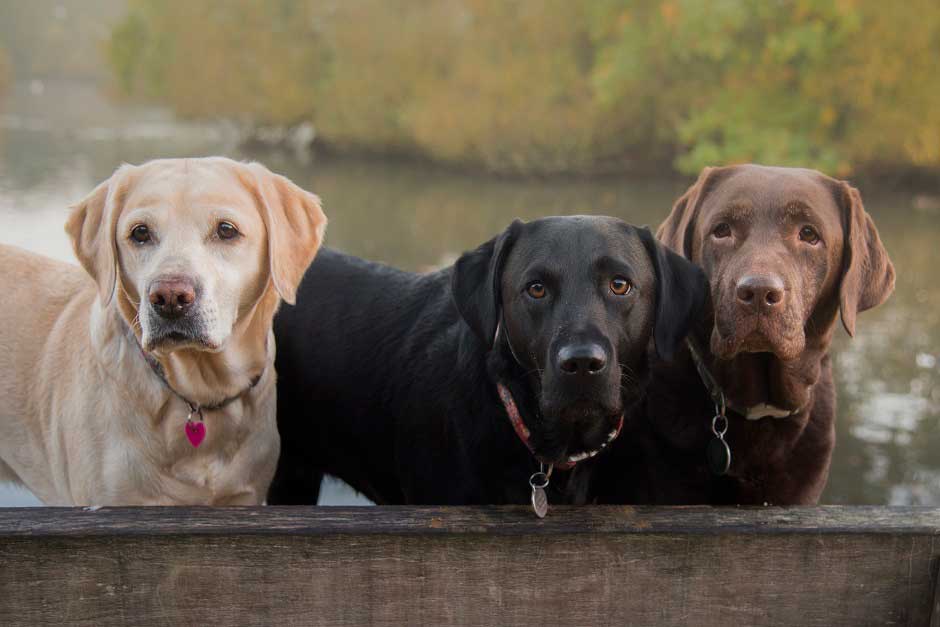The Labrador is an amazing breed, these dogs are beautiful in every way. They look great and are unmatched in friendliness. In addition, they are excellent learners and try to please the person. The Labrador Retriever sincerely loves the whole world and enjoys everyday and event, he is the embodiment of positive, it is impossible not to fall in love with such a dog.
What is the Nature of a Labrador?

Labradors are very affectionate dogs, insanely loyal, kind, allowing absolutely everything, and having no aggression at all. If a Labrador is showing aggression, then it is not a Labrador.
We have an imported Labrador dog from Sweden. He is the leader of our pack of dogs, although the Weimaraner males, who also live in our kennel, try to move him, he does not allow them. At the same time, he is friends with everyone. And when two Weimaraner males had a fight, he came to the one who was more “beaten”, lay down next to him, licked his face and paws. And he himself will never get into a fight first, although he will stand up for himself.
Breeder Observations: Labradors are brooding dogs, they are ready to accept everyone and are friends with everyone, including other animals.
In general, the Labrador is a very calm dog, although due to improper breeding it was believed that they were almost hysterical. Labradors are not hysterical at all. It is somewhere even a lazy dog, for which the highest happiness is to sleep next to the owner. Moreover, if the Weimaraner lies down next to you and puts its paws and head on you, then the Labrador will be located nearby, he is not so intrusive.
For children, Labradors are nannies. If a family with small children asks me who to have, a Weimaraner or a Labrador, I always recommend a Labrador. I probably could have left a small child alone only with a Labrador and no other dog of another breed.
Labradors love the water, they live there. At the same time, they are piglets: on a walk, they will not bypass a single puddle.
What is the Main Purpose of a Labrador Retriever?

Labradors are hunters, gun dogs.
You should always consider the purpose of the dog. If we take huskies, which are running dogs, it is not surprising that they constantly run away. As for the gun dogs, the hunter hits the game from under them, that is, the dog should go no further than a rifle shot (maximum 200 meters). And this feature – not to go far from your person – is genetically inherent in the breed. We walk our dogs off leashes, and I’m not afraid to lose them.
In addition, Labradors serve beaten game.
How Easy is It to Train a Labrador Retriever?
Labradors are fairly well trained. Although Labradors are very fond of turning on the “I can’t hear” option, there are magic words to which they react very well and quickly execute all commands.
Breeder Observations: Labradors are foodists and highly motivated to eat. There are dogs who love to run after pullers, for example, but not all.
How to Care for a Labrador Retriever?
Labradors molt, and they molt strongly and for a long time.
But the coat of the Labrador is waterproof, the skin does not get wet, and therefore they do not smell like a dog.
How Healthy is a Labrador Dog?

Chocolate Labradors, like all dogs carrying the chocolate gene, are allergic. That is, all Labradors suffer from allergies, but especially chocolate ones. One of our dogs is allergic to beef, lamb, duck, but contrary to popular belief, not chicken.
Breeder’s recommendation: Very often Labradors are allergic to flea bites, so you need to treat them for parasites constantly.
Allergies mainly affect the ears, as they fit snugly and there is no ventilation.
In addition, Labradors are prone to genetic diseases, and there are quite a few of them. Therefore, it is advisable that genetic tests are done before breeding dogs. We do tests for our dogs.
Another characteristic of Labradors that owners often do not know about is that these dogs should not be fed calcium during childhood. With an excess of calcium in Labradors, the radius of the forelegs begins to grow incorrectly, and this leads to dysplasia of the elbow joints. I give my puppies vitamins only when they are indicated.
